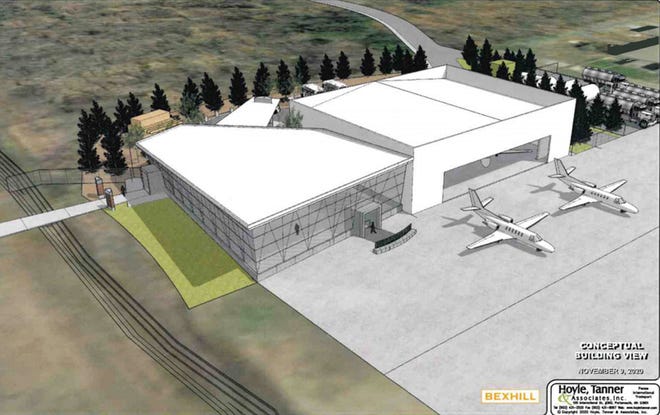Over the years, the Seacoast has faced many threats to its soil, waterways, and drinking water. We now face another threat to all three.
Texas-based Million Air proposes to build a 90,000-gallon, industrial-sized aviation fuel farm at Pease. Million Air plans to build it next to wetlands and pave a road through them. These sensitive wetlands are connected to the Pease drinking water supply and the North Mill Pond. Storing and handling chemicals like jet fuel and deicing fluid on that sensitive site poses a large-scale risk that cannot be allowed to fly under the radar.
Here are our top concerns, which witnesses raised with the Department of Environmental Services (DES) Wetlands Bureau during its hearing or public comment period on Million Air’s wetlands permit application: Spills at Million Air’s site could reach our drinking and surface water.
Previous story:Million Air’s big project at Pease, opposed by competitor, faces environmental scrutiny
The Haven well’s water supply is part of the $60-million-plus remediation effort at Pease. The citizens group Testing For Pease expressed concern that this project could jeopardize the progress made to remediate contamination at Pease. We agree. A hydrologist, Danna Truslow, who presented to the DES Wetlands Bureau, identified these key concerns:
- These wetlands are connected, both naturally and via the defunct city well heads called “Gosling Station” to the Haven well’s underground water supply. The Haven well is a primary source of water serving Pease and part of Newington.
- These wetlands drain into Hodgson Brook, which runs through our residential neighborhoods and into the North Mill Pond and Piscataqua River. A spill on this site could make its way into the community outside Pease.
- The “impact of this project must be viewed in regional and local perspectives.”
We agree. On a more basic level, Million Air’s site development plans very likely underestimate the wetlands impact of this project. An engineer told the Wetlands Bureau that Million Air’s site proposal shows significantly smaller wetlands than were shown in a 2017 study of the same site by a different developer who decided not to build. The community should demand an independent study to identify this project’s total wetlands impact.
Unfortunately, Million Air’s proposal is moving forward with momentum. The DES Wetlands Bureau recently approved Million Air’s wetlands permit application. While this seems contrary to DES’ protective role, the Wetlands Bureau does not base its decision on operations next to wetlands. So the permit does not comment on the wisdom, safety, or potential environmental impact of Million Air’s proposed operation. The permit is not a safety endorsement, nor does it establish or prove that the project is safe for us or our water.
Given the Wetlands Bureau’s limited purview, the wetlands permit does not address any of the risks or overwhelming scientific data that was submitted in opposition to Million Air’s proposed project. The permit fails to mention that Pease has other available sites without wetlands where Million Air could run its operation without jeopardizing the environment and our water supply.
The permit should serve as a wake-up call, a reminder of our past issues with per- and polyfluoroalkyl substances (PFAS contamination), and a warning about the risk to our future.
Wherever this project goes next for approval, including the Pease Development Authority (PDA) Board, decision-makers should weigh the public good against one Texas-based private business’ economic gain. This is especially true when Million Air could develop this project on one of Pease’s available safer, non-wetlands sites. The PDA Board will have the ultimate decision to grant or deny a lease to Million Air. The PDA Board also has the authority to propose safer non wetland sites to Million Air, if they are concerned about the risks.
The Portsmouth Conservation Commission unanimously opposed this project, but the wetlands permit was issued anyway. More must be done. City councilors, Select Boards, community leaders and especially Seacoast residents must make their opposition heard.
One thing that is obvious is that there are well-founded concerns and questions without good answers. Those who forget their Pease history are doomed to repeat it. We must protect these wetlands and our local water supply as well as ensure the safety of our lives and the lives of future generations.
Dania Seiglie lives in Rye. Dudley Dudley lives in Durham and in 1976 was the first woman elected to the New Hampshire Executive Council.
[ad_2]
Originally Appeared Here
